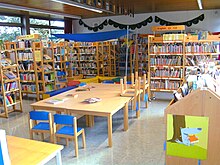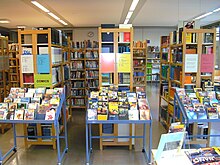European School Karlsruhe
| European School Karlsruhe European School Karlsruhe |
|
|---|---|

|
|
| type of school | European school |
| founding | 1962 |
| address |
Albert-Schweitzer-Str. 1 |
| place | Karlsruhe |
| country | Baden-Württemberg |
| Country | Germany |
| Coordinates | 49 ° 2 '46 " N , 8 ° 26' 48" E |
| student | over 1000 |
| management | Daniel Gassner |
| Website | www.es-karlsruhe.eu |
The European School Karlsruhe (short: ESK, ESKA or Eskar) is one of 13 European Schools that were founded to ensure that children of parents who work in EU institutions are taught in their own mother tongue. It was opened in 1962 in the Karlsruhe Waldstadt for the children of the employees of the Institute for Transuranium Elements (ITU) . Nowadays everyone can go to school for a fee, which is controlled by all EU members and is an institution under public law. The offer ranges from kindergarten to higher education entrance qualification , which is taken as a European Baccalaureate . The ESK has language sections D (German), E (English) and F ( French ). In these sections all subjects are taught by native speaking teachers.
Regardless of the language section, students can choose a language other than their mother tongue. Students can learn up to five modern languages plus Latin and ancient Greek.
Technical Equipment
Every classroom has at least one PC, a projector and mostly a smartboard. There are also three large PC rooms. The school's centrally administered computer system works with Windows 7 and provides all of the important computer programs required for school purposes. This also provides the technical basis for teaching ICT (Information and Communication Technology), which is taught in two levels.
School hours
In the European school system there are twelve school years, with the 1st to 5th grade being elementary school (GS). This is followed by the 1st to 7th grade secondary school (OS).
The lesson times vary as follows: School starts at 8:05 am in each grade. In kindergarten and the 1st and 2nd grade of the elementary school, school ends on Mondays, Wednesdays and Fridays at 12:30 p.m., Tuesdays and Thursdays at 3:30 p.m. In the remaining classes of the elementary school and the lower grades of the high school, Monday is also a “long day”, which means that Monday lessons take place until 3:30 pm. From the 4th grade of the secondary school Wednesday will also be a “long day”, and from the 6th grade onwards, depending on the subject chosen, Friday can also be a “long day”.
kindergarten
Children from the age of four can attend the ESK kindergarten. The groups are primarily divided according to language rather than age. The basic features of the learning objectives correspond to those of monolingual kindergartens: social skills, living in a group, playful approach to letters and numbers, handicrafts and painting.
primary school
Children are admitted to the ESK primary school at the age of six (or the child reaches the age of six in the calendar year of the current school year). The lessons consist of the main subjects mother tongue, first foreign language and mathematics and the minor subjects art, music, sport and religion or ethics. In addition, so-called "European lessons" are offered in which different activities are undertaken in mixed language groups. The objectives in the primary school of the ESK correspond to those of the monolingual primary school, beyond teaching the first foreign language and developing an understanding of other languages and cultures: literacy, arithmetic, reading, writing, independent work.
High school
The three cards
It is part of the school philosophy that the students are supervised by teachers even when there are no lessons. Among other things, there is a supervised lounge with PCs available: the Permanence. With the red card , the student is not allowed to leave school in any free period and must therefore stay in school every day. With the yellow card , the student may only leave school in free periods at the beginning and at the end of school and may not be absent from free periods in the middle of the school day. Only available from class 4. The green card is only available from the 6th grade. With this card the student can leave the school premises in every free period.
Lower level (1 to 3)
The 1st to 3rd grade high school are called the "observation level".
There are no electives in the 1st grade and, apart from the second language, only the mother tongue is taught. The subject is omitted and Science Humaine (also called SH; geography and history) and Integrated Science (also called IS; biology, chemistry and physics) are taught instead.
The third language is added in the 2nd grade. You can choose from German, English, French, Spanish, Ancient Greek, Irish etc.
There are various changes in the 3rd grade:
- Science Humaine is taught in the second language
- ICT is an elective
- Three choices: art (2 h) and music (2 h), art (2 h) and Latin (4 h), music (2 h) and Latin (4 h)
Intermediate (4 and 5)
- Compulsory subjects: language 1, language 2, language 3, religion / ethics, sport, history, geography, physics, chemistry, biology,
- Elective subject: Mathematics (weak: 4 h / strong 6 h)
- Electives: Language 4 (4 h), Latin (4 h), Economics (4 h), Computer Science (2 h), Art (2 h), Music (2 h)
In total, the student must have between 31 and 35 hours per week. From the 5th grade on, the so-called Partiels are written, which are large works that the entire grade level writes and have a significant effect on the grade.
Advanced level (6 and 7)
- Compulsory subjects: language 1, language 2, sport, religion / ethics
- Elective subjects: Mathematics (weak: 3 h / strong 5 h / specialization: 8 h), philosophy (compulsory 2 h / option 4 h), history (compulsory 2 h / option 4 h), geography (compulsory 2 h / option 4 h )
- Electives: Latin, economics, language 3, language 4, art, music, language 1 specialization, language 2 specialization, physics, biology (2 h or 4 h), chemistry
- Supplementary subjects: art, music, language 5, computer science, laboratory studies, economics
At the end of the seventh grade of secondary school, the European Baccalaureate is taken. This is valid throughout the EU, Switzerland and the USA without any "foreigner examination" as a university entrance qualification and must be recognized.
Grading system
There are no grades in primary school, just a similar system: there are crosses on the certificate, with the field on the right representing the top grade. Arrows show the evaluation of the 2nd half of the year.
In the Oberschule there are grades from 0 to 10. From the 4th grade onwards the grade is divided into an A grade (oral) and a B grade (written / work).
The libraries
The European School Karlsruhe has two libraries: a primary school library with approx. 22,000 media and a high school library with more than 16,000 media. Most of them are books, but there are also a large number of DVDs and audio books available, as well as a range of magazines in English, French and German that are regularly updated. The largest language groups are German, English, French, Italian and Dutch. In total, media are available in more than ten languages, including Spanish, Portuguese, Polish, Hungarian, Finnish, Danish and Greek.
Buildings and grounds
The school, located in a quiet forest location, consists mainly of six buildings:
- Building A: Kindergarten and grades 1 and 2 of primary school
- Building B: Grades 3 to 5 of the primary school and primary school library
- Building C: All high school classes and high school library
- Building V: administration, conference room and auditorium
- canteen
- Sports halls: two sports halls and changing rooms
Other places:
- Europator: entrance gate
- Red square: sports field
- Two fountains in the entrance area
A few meters in front of the school there is a bus and a tram stop with three school trams and several school buses that come at the beginning and end of school.
Contacts with other European schools
Students of the European Schools meet every year at the European Schools Science Symposium (ESSS), a science competition. The ESK team is called Science Interests Group (SIG).
Prices:
- 2006/2007: 3rd place in the Senior PowerPoint category with the project: "N 2 laser"
- 2007/2008: 1st place in the Senior PowerPoint area with the project: "Autonomous Shelf"
Known students
- Eric Veulliet (* 1963), geologist and university rector
- Lena Ganschow (* 1980), journalist
- Jérémie Kaiser (* 1988), writer and illustrator
Web links
Individual evidence
- ↑ contact person. In: www.es-karlsruhe.eu. Retrieved April 8, 2020 .
- ↑ The new cafeteria was completed in November 2008. (see . New canteen . (PDF) (Not available online) In: www.eskar.org. Formerly in the original ; accessed on April 9, 2020 . ( page no longer available , searching web archives ) )

